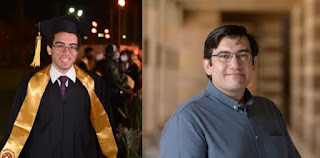December 29, 2021, Cairo – Mostafa Youssef, assistant professor of computational materials science and engineering in the Department of Mechanical Engineering at The American University in Cairo (AUC), and Mohamed Abdallah '21, a double major in mechanical engineering and physics, have published their research on an innovative technique for making ceramics more durable in the prestigious Physical Review Materials, a top-tier journal in materials physics. Youssef and Abdallah focused on identifying a model that demonstrated how certain defects in ceramics move when exposed to electrical fields. “We collected previous models from literature starting from the 1940s all the way to 2020,” Youssef explained. “And we made a computer simulation – basically, we brought a little piece of ceramic on the computer, applied an electric field and saw how the defects move.”
Youssef expressed that they are very proud that they made it [in the journal]. “This is a Q1 journal [Impact 3.99] from the family of the Physical Review series whose papers are permanently cited in Nobel Prize awards in physics and chemistry.” Q1 journals make up the top 25% of journals in an area of research.
In his courses at AUC, Youssef and his students explore different materials and their properties using simulations, modeling and theory. The professor had previously conducted research on a related problem in 2017 during his postdoctoral studies at MIT.
There were five models in total from 1949- 2020, all of which Youssef and Abdallah carefully assessed until they could pinpoint which model was superior. The simulations themselves sometimes took months to finish, and if there were errors in the code that Youssef and Abdallah wrote, they would have to start again.
Prior work found that the air gaps in a piece of ceramic were eliminated when introduced to large electric fields, making the material denser and more durable. “Usually, people do this with very high temperatures using furnaces in a process called sintering,” Youssef said. “But this is quite expensive. And people are trying to find alternatives that are more cost-efficient.”
Flash sintering is a promising alternative, as it succeeds in densifying ceramic materials faster and requires less heat than traditional sintering. High electric fields are also used to store information to novel types of Random Access Memory cards for computers that will push the current limits of memory speed.
Youssef and Abdallah continued in this area of study in 2019, after they had met the previous year when Abdallah took Youssef’s Numerical Methods course. “During my studies, I grew to appreciate how materials optimization can have a huge influence on the performance of devices or on creating new devices,” Abdallah said. “So maybe seven or eight months after the course, I got in touch with Dr. Mostafa to conduct research as an undergrad in this field.”
“One of the things that hit me during this time is that research is an iterative process,” Abdallah said. “It often doesn’t work out right away, so you need to be flexible and adaptable.”
Youssef admired the patience Abdallah demonstrated throughout the process, especially considering his status as an undergraduate student. “Many undergraduate students need to see something coming out immediately, after three or four months,” he said. “But Mohamed was patient. And I think this is a major quality in good research – patience.”
Other challenges included securing resources for their research and continuing during the coronavirus pandemic. “These simulations need a lot of computational power. And we were very, very limited on the resources,” Youssef explained. “The other thing that was overwhelming for us was COVID. It took us a while to coordinate things and to see how the workflow could run.”
Even after the two finished their paper, they still faced what Youssef described as an “extremely rigorous” review from the academic journal. So rigorous, Youssef recalled, that Physical Review famously critiqued a paper written by Albert Einstein in the 20th century, which prompted the physicist to stop submitting his work to the journal.
Beyond taking pride in their work, Youssef and Abdallah also hope that their work inspires others, especially undergraduate students, at AUC and beyond to conduct their own research in this field.
“We need such a push for undergraduate research,” Youssef said. “Our undergraduate students are capable of doing high-quality research – it just takes a little bit of patience.”
Abdallah, who is now pursuing a masters at the École polytechnique fédérale de Lausanne (EPFL) in Switzerland, is grateful for the opportunity and guidance provided to him by Youssef.
Youssef continues to lead AUC students in this field, reporting that there are two graduate students currently continuing his and Abdallah’s research.
For regular updates from the University during coronavirus visit www.aucegypt.edu/coronavirus
For more information about the university news and events follow us on Facebook http://www.facebook.com/aucegypt and Twitter @AUC
Founded in 1919, The American University in Cairo (AUC) is a leading English-language, American-accredited institution of higher education and center of the intellectual, social, and cultural life of the Arab world. It is a vital bridge between East and West, linking Egypt and the region to the world through scholarly research, partnerships with academic and research institutions and study abroad programs.
The University offers 40 undergraduate, 52 master’s and two PhD programs rooted in a liberal arts education that encourages students to think critically and find creative solutions to conflicts and challenges facing both the region and the world.
An independent, nonprofit, politically non-partisan, non-sectarian and equal opportunity institution, AUC is fully accredited in Egypt and the United States.

